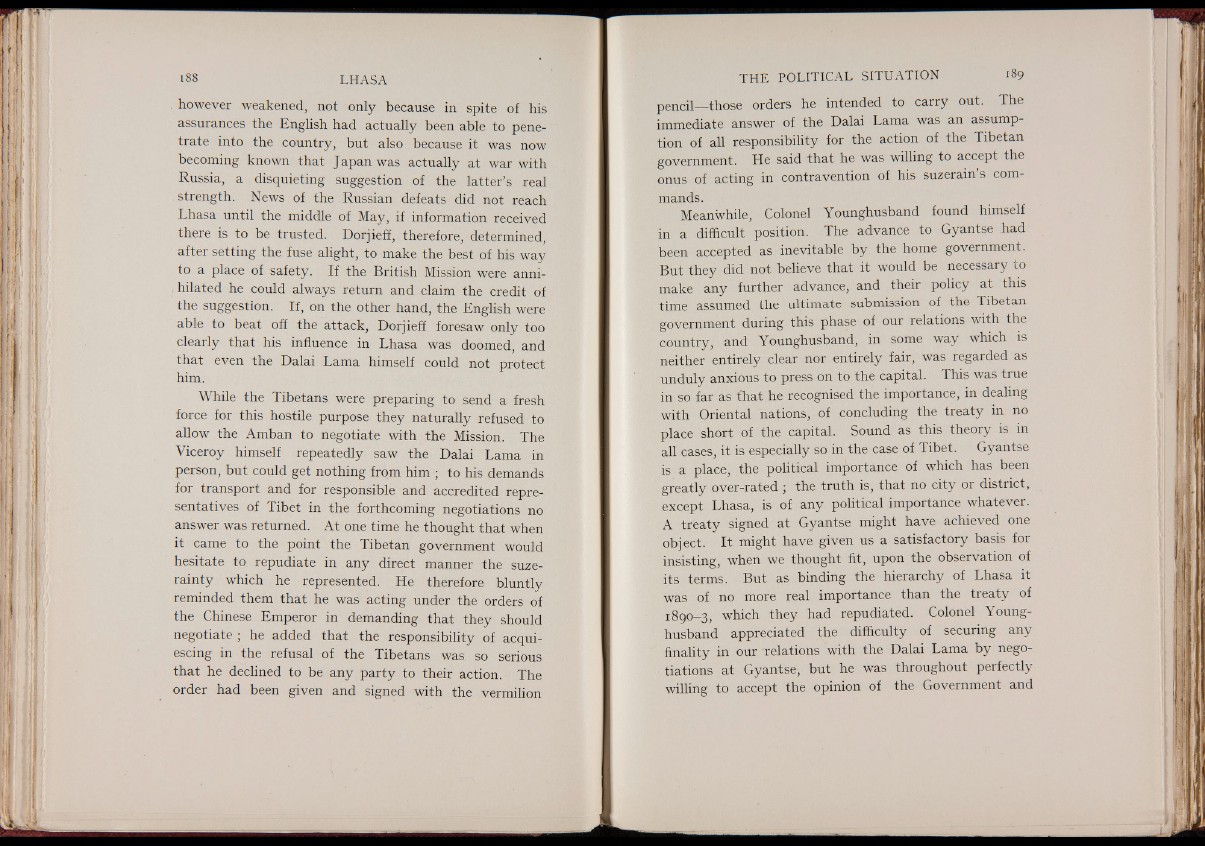
however weakened, not only because in spite of his
assurances the English had actually been able to penetrate
into the country, but also because it was now
becoming known that J apan was actually at war with
Russia, a disquieting suggestion of the latter’s real
strength. News of the Russian defeats did not reach
Lhasa until the middle of May, if information received
there is to be trusted. Dorjieff, therefore, determined,
after setting the fuse alight, to make the best of his way
to a place of safety. If the British Mission were annihilated
he could always return and claim the credit of
the suggestion. If, on the other hand, the English were
able to beat off the attack, Dorjieff foresaw only too
clearly that his influence in Lhasa was doomed, and
that even the Dalai Lama himself could not protect
him.
While the Tibetans were preparing to send a fresh
force for this hostile purpose they naturally refused to
allow the Amban to negotiate with the Mission. The
Viceroy himself repeatedly saw the Dalai Lama in
person, but could get nothing from him ; to his demands
for transport and for responsible and accredited representatives
of Tibet in the forthcoming negotiations no
answer was returned. At one time he thought that when
it came to the point the Tibetan government would
hesitate to repudiate in any direct manner the suzerainty
which he represented. He therefore bluntly
reminded them that he was acting under the orders of
the Chinese Emperor in demanding that they should
negotiate ; he added that the responsibility of acquiescing
in the refusal of the Tibetans was so serious
that he declined to be any party to their action. The
order had been given and signed with the vermilion
pencil—-those orders he intended to carry out. The
immediate answer of the Dalai Lama was an assumption
of all responsibility for the action of the Tibetan
government. He said that he was willing to accept the
onus of acting in contravention of his suzerain’s commands.
Meanwhile, Colonel Younghusband found himself
in a difficult position. The advance to Gyantse had
been accepted as inevitable by the home government.
But they did not believe that it would be necessary to
make any further advance, and their policy at this
time assumed the ultimate submission of the Tibetan
government during this phase of our relations with the
country, and Younghusband, in some way which is
neither entirely clear nor entirely fair, was regarded as
unduly anxious to press on to the capital. This was true
in so far as that he recognised the importance, in dealing
with Oriental nations, of concluding the treaty in no
place short of the capital. Sound as this theory is in
all cases, it is especially so in the case of Tibet. Gyantse
is a place, the political importance of which has been
greatly over-rated j the truth is, that no city or district,
except Lhasa, is of any political importance whatever.
A treaty signed at Gyantse might have achieved one
object. It might have given us a satisfactory basis for
insisting, when we thought fit, upon the observation of
its terms. But as binding the hierarchy of Lhasa it
was of no more real importance than the treaty of
1:890-3, which they had repudiated. Colonel Younghusband
appreciated the difficulty of securing any
finality in our relations with the Dalai Lama by negotiations
at Gyantse, but he was throughout perfectly
willing to accept the opinion of the Government and